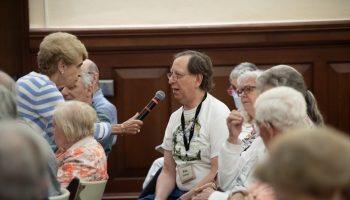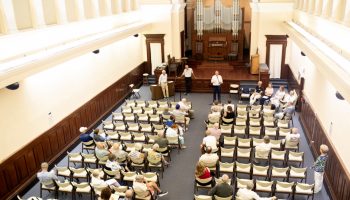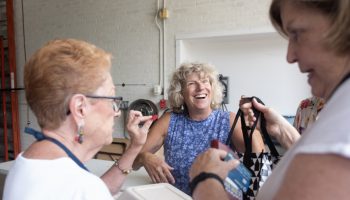Cody Englander
Staff Writer
Chautauquans will have two chances today to hear updates — and provide feedback — on proposed budget cuts to the Institution’s budget and its work toward financial sustainability.
After a July 28 webinar in which Interim Chief Executive Kyle Keogh said the Institution would be facing significant budget cuts — anywhere from $4 to $6 million — this calendar year, Institution administration and the Chautauqua Dialogues team pivoted the focus of the last three Forum Dialogues sessions of the season, highlighting the Institution’s finances. The last session is scheduled for 3:30 p.m. today in the Hall of Christ.
Additionally, during the July 28 webinar, Keogh said he would convene an update session in mid-August. That webinar, “Pathway to Financial Resilience, Community Update #2” was announced over the weekend, and is scheduled for 1:30 p.m. today on Zoom. Chautauquans can register at update.chq.org.
During Week Eight’s Forum Dialogues, held last Monday in the Hall of Christ, Keogh, along with members of the Institution’s executive team and members of the Chautauqua Institution Board of Trustees’ Financial Sustainability Working Group, fielded questions and suggestions from community members about the budget. During the town-hall style meeting, Keogh discussed Chautauqua’s housing crisis and areas of potential savings.
One of the first topics discussed covered both possible housing within buildings of Boys’ and Girls’ Club, and the ongoing lifeguard shortage, as one of Keogh’s first proposals in his tenure was to explore the reactivation of Heinz Beach. One Chautauquan’s idea was to have lifeguards living on-campus.
“You need not pay a high wage if you’re providing room and board, because room and board is considered in the remuneration,” the community member said. “When you live here, it’s a lot different than coming in just to be a lifeguard for a certain number of hours. That’s when you learn to absorb what’s going on here and have a love and appreciation for the Institution.”
Another community member, named Megan, brought up ticket price changes, suggesting a “sliding scale” for raising the prices. Yet another attendee, who did not state her name, suggested bringing back cheaper community tickets for locals outside of the gates.
“Whereas somebody might not be from the community, might not spend $50 for a symphony ticket, they might spend $25,” she said.
Keogh clarified on the current scaled pricing of gate passes.
“The discount from a one-week ticket to a season ticket is roughly 50%, so it’s roughly about $100 a day, give or take,” he said. “If you come for one week and it’s $50 per day if you come for the season.”
The 50% discount is substantial, according to Keogh, stating that while a lot of things are being looked at, nothing is finalized. He said that one of the reasons the budget shortfall was announced mid-season was to get as much input as possible.
“We want to make sure that you saw some of that information, not that we had all the answers,” he said. “But we also know when folks leave in two weeks, you start to worry about other things, and we didn’t want to make changes in the dead of night without you having an idea that we had any difficulties for what we were considering.”
Keogh spoke more about the Institution’s relations with county residents, and said he would look at re-introducing Community Nights, bringing locals into the grounds for a cheaper price. He also spoke about partnerships with local elected officials, specifically around Chautauqua Lake.
But by and large, “a lot of the local folks think of this as Willy Wonka’s chocolate factory,” he said. “They know that it’s here. They know it’s interesting, but they have no idea what goes inside.”
Keogh stated that the current biggest points of integration between locals and the Institution is the Chautauqua Golf Club and the Turner Community Center, which operates year-round as a fitness center.
One of the largest institutional problems is the real estate within the grounds. It’s been a major focus for Keogh and the board members.
“The cost of accommodation has gone up substantially now. It’s a testament to the quality of this place,” Keogh said. “…We clearly have enough demand for some of these areas. We do not have enough supply. That is one of our real things that we’re constrained on and our supply continues to decrease.”
Between 2019 and 2025, the cost of the accommodations that the Institution rents for staff has gone up 80%, he said. And the cost to build has gone up 40% in that same time.
“The financial cost of it is becoming a real prohibitive factor for folks, and it is not necessarily the gate pass,” Keogh said. “It’s the housing right? Unless you’re sticking to denominational housing, you’ve likely seen substantial increases, and that’s not something we can control.”
Lisa, another community member who described herself as one of those in the “one- to two-weeker” demographic, and who works in development and housing, suggested help from the state or county, citing conduit bonds, tax credits and high tech tax credits, mainly for housing employees.
“My solution is to partner with the state, the county or other local authorities to build some housing,” she said. “There’s plenty of surface parking lots around and buildings that could come down in order to build.”
Keogh and the board explored the idea after meeting with Howard Zemsky, president and CEO of Empire State Development and Commissioner of the New York State Department of Economic Development. They look to create a subcommittee of board members, staff members and community members to explore this idea.
Pat, a community member, suggested creating camping sites to draw in people outside of Chautauquan Institution. She believed it may also fix some of the housing issues.
“It would bring us more outdoor people,” Pat said. “It would bring diversity. It would bring us back to our roots.”
Keogh noted the financial investment it would cost to fund this, as well as taking up surrounding parking areas used for concerts.
“My first focus is really going to be figuring out how we can put more condos and denominational-style houses inside the grounds,” Keogh responded.
There’s also an ongoing conversation between the board and Jamestown Community College, in the hopes of using vacant dormitories during the summer for Institution employees.
In addition to housing costs, a key area of focus is operational efficiencies — particularly with The Chautauquan Daily, where expenses are projected to exceed revenue by $170,000 this year, and CHQ Assembly, where the number is about $243,000.
“Comes out, based on your responses, you really want the Daily,” Keogh said. “…We’re going to need to raise the price on that fairly substantially and we’d love to figure out if we could endow some of those positions.”
Similarly, Keogh said CHQ Assembly would need to see substantial increases in subscriber costs.
“It’s actually a pretty cool setup, and it’s important to do it right, we need to substantially increase that cost, that price,” Keogh said.
Another area of investment is booking guest lecturers earlier. This comes after the Institution has booked Ken Burns, changing one of the 2026 weekly themes in the process.
“I’m sure some of you realize that instead of just saying there’ll be two or three orchestra concerts in a week, we’re giving you those names and some of the big shows much sooner,” said Deborah Sunya Moore, senior vice president and chief program officer.
The conversation then shifted to the offseason. Tim Brown, a community member, asked Keogh what financial efforts have been made to utilize the grounds during the offseason. During the offseason, the Athenaeum is open on the shoulder seasons for hotel business, weddings and business conferences. However, the winter season doesn’t give much to work with, especially areas of the grounds that aren’t winterized, such as the Athenaeum. According to Keogh, that process would take $100 million.
Alcohol in the Amphitheater, an idea discussed in the initial webinar, the Week Seven Forum Dialogues, and during a special input session during Week Eight, was also brought up.
“It is a dissatisfier right now for someone coming in for a concert who expects to be able to have a drink at a concert,” Keogh said. “If you’re a 40-year-old person, and you’re told you cannot have alcohol in there, a single drink, it seems a bit strange.”
Moore noted competitors’ venues allowing for the same thing, which, sometimes, is a dealbreaker for artists.
“In the last three years, I have lost my first two artists because we did not have food and beverage (service in the Amp),” said Moore.




